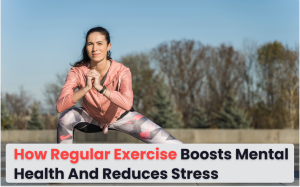
How Regular Exercise Boosts Mental Health and Reduces Stress
In today’s fast-paced world, managing stress and maintaining mental well-being can be challenging. Whether it’s work, family responsibilities, or social obligations, stress can pile up quickly, affecting our emotional health. Fortunately, regular exercise offers a powerful, natural way to boost mental health and combat stress. Research shows that physical activity can significantly reduce anxiety, depression, and negative mood while improving cognitive function, self-esteem, and overall emotional resilience. For audiences in the USA and Canada, where the pressures of modern life are constantly increasing, integrating exercise into daily routines can be transformative.
The Science Behind Exercise and Stress Reduction

When you exercise, your body releases chemicals called endorphins, which interact with receptors in your brain to reduce your perception of pain and trigger a positive feeling. This “runner’s high” helps to improve your mood and reduce stress levels. Exercise also lowers the levels of cortisol, a hormone that is released in response to stress. Elevated cortisol over time can lead to mental health problems, such as anxiety or depression, so controlling it through regular physical activity is essential.
In addition to endorphins, exercise increases the production of serotonin and dopamine, neurotransmitters that regulate mood and feelings of well-being. These chemical reactions create a natural buffer against stress, helping to alleviate symptoms of depression and anxiety, while promoting an overall sense of calm and contentment.
Exercise as a Mood Booster

It’s common to feel down after a long day or during stressful times, but regular exercise can help lift your mood, making it easier to face daily challenges. Activities like walking, jogging, cycling, or even dancing stimulate the release of feel-good chemicals in the brain. Studies have shown that people who exercise regularly are less likely to experience anxiety or depression than those who lead a sedentary lifestyle.
Furthermore, exercise helps break the cycle of rumination—those repetitive negative thoughts that often contribute to stress and depression. By engaging in physical activities, you are redirecting your focus away from stressors and allowing your mind to rest. This mental break improves your outlook on life and boosts resilience.
Exercise Improves Sleep and Reduces Stress

One of the most important factors in managing mental health is sleep. Poor sleep quality and insomnia are often linked to heightened stress levels and anxiety. Regular physical activity improves sleep by helping you fall asleep faster, sleep deeper, and wake up feeling more refreshed. When your body is well-rested, you can better manage stress and have a more positive outlook on life.
Incorporating moderate exercise, such as brisk walking, yoga, or swimming, into your daily routine can significantly improve sleep quality. Just make sure to avoid vigorous exercise close to bedtime, as it may have the opposite effect and interfere with sleep.
Exercise as a Tool for Managing Anxiety

Anxiety is a growing issue in North America, with millions of people struggling with its effects. Exercise is one of the best natural remedies for anxiety because it provides an outlet for nervous energy, which helps reduce feelings of tension. Physical activity not only helps calm the body but also shifts the brain’s attention away from anxious thoughts.
Mind-body exercises like yoga and tai chi are particularly effective for reducing anxiety. These practices combine physical movement with mindfulness and deep breathing, which encourage relaxation and calm the nervous system. Yoga, in particular, has been found to lower cortisol levels and improve mental health by promoting a state of mindfulness and presence, which combats the racing thoughts associated with anxiety.
Building Confidence and Self-Esteem Through Fitness

Exercise not only helps reduce stress, but it also improves self-esteem and confidence. As you start seeing progress in your physical fitness, whether it’s losing weight, building strength, or increasing endurance, you develop a sense of accomplishment. This boost in self-esteem has a direct impact on mental health, helping you feel more capable and resilient in other areas of life.
Additionally, the discipline and consistency required for maintaining an exercise routine can translate to other parts of life. As you develop healthy habits, it becomes easier to manage stress and face challenges with a more positive mindset.
Social Interaction and Emotional Support

For many, exercise provides an opportunity to connect with others, whether through fitness classes, group sports, or walking with friends. These social interactions offer emotional support and reduce feelings of isolation, which is particularly important for mental health. Being part of a fitness community or even having a workout buddy can enhance the enjoyment of exercise and provide accountability, making it easier to stick to your fitness routine.
In both the USA and Canada, where loneliness and isolation can sometimes be a concern, especially after the pandemic, participating in group exercise activities can help rebuild social bonds and strengthen mental resilience.
Exercise as a Form of Meditation

Physical activity can act as a form of moving meditation, especially exercises that require repetitive motions like swimming, cycling, or running. These activities allow your mind to focus on the rhythm of the movement, the sound of your breath, or the sensations in your body, bringing you into a meditative state.
This meditative quality of exercise helps you escape from stressors and quiet your mind, providing mental clarity and a sense of peace. Engaging in these activities regularly can help improve emotional balance and reduce the overwhelming feelings often caused by stress.
Summary
Exercise is a natural and effective way to improve mental health and reduce stress. It releases endorphins, boosts mood, reduces anxiety, improves sleep, and builds self-esteem. Regular physical activity is essential for maintaining mental well-being and can be especially beneficial in today’s fast-paced world. Incorporating exercise into daily life is crucial for managing stress and staying mentally resilient.




